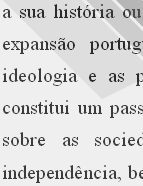

................................
This situation led to the celebration of a great and united nation "from Minho to Timor", a phrase that became commonplace from 1961 onwards; while Salazar stressed that Portugal was a "nation spread across the world" (1963), without racial prejudice in its colonial and civilisational practices, Franco Nogueira, the Minister of Foreign Affairs, stated in a speech intended both for external consumption and to calm domestic tensions resulting from the colonial war and the country's economic and political situation " we, and we alone, brought to Africa the notion of human rights and racial equality before anyone else; and we, and we alone practise multiracialism, regarded by all as the most perfect and boldest expression of human fraternity and sociological progress. " (The Third World, 1967, 197-198).
The ideologization of knowledge
The history of the Portuguese presence overseas was constantly called upon to create a type of knowledge that would account for the existence of the peoples, who - in the name of colonial realism - needed to be kept under tutelage, becoming the producers of economies run by the Portuguese, 'incapable' of working in climatic conditions as particular as those of the tropics. Racism thus acquired a climatic tinge: the superiority of the white man became visible, and could even be measured, due to his physical fragility that contrasted with his intellectual vigour. Only the "savages," that is, the men characterised by a rusticity that put them on the same level as animals, could endure such relentless nature.
This discourse, reinforced by the 19th century theoretical framework of Paul Broca, entirely dominated by measurable values of the somatic structure, from the bones to the thickness of hair, found a staunch defender in Oliveira Martins: "documents abound showing us that the black man is an anthropologically inferior type, not infrequently close to the anthropoid, and hardly worthy of being called a man", and he added that "if there is no relationship between the anatomy of the skull and intellectual and moral capacity, why should the philanthropy of the black man stop? Why shouldn't the gorilla or the orangutan be taught the Bible, for although they do not speak they still have ears, and will understand almost as much as the negro the metaphysics of the incarnation of the Word and the dogma of the Trinity? (Portugal em África [Portugal in Africa...] [1891],1953, 261-263).
